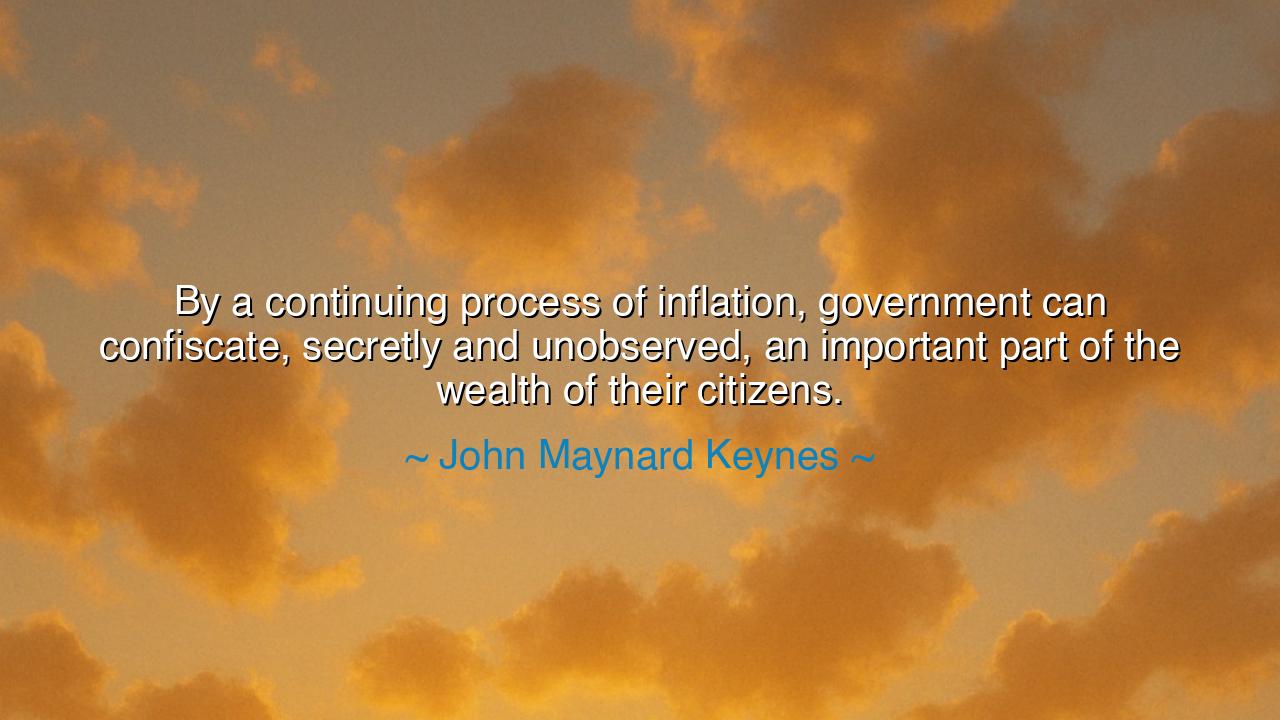
By a continuing process of inflation, government can confiscate
By a continuing process of inflation, government can confiscate, secretly and unobserved, an important part of the wealth of their citizens.






"By a continuing process of inflation, government can confiscate, secretly and unobserved, an important part of the wealth of their citizens." — John Maynard Keynes
Listen well, O students of history and guardians of freedom, for these are the words of John Maynard Keynes, a man whose mind pierced through the veil of economies and empires. Though he spoke in the language of finance, his warning was not merely about money — it was about power, about the silent way in which governments may reach into the pockets of their people without lifting a single law or sword. When he said that “by a continuing process of inflation, government can confiscate, secretly and unobserved, an important part of the wealth of their citizens,” he revealed the most subtle of thefts: the kind that hides behind arithmetic and time, that drains the fruits of labor while leaving the illusion of possession intact.
To understand the meaning of this saying, we must first grasp what inflation truly is. It is not merely the rise of prices, as many think, but the decline of value — the slow erosion of purchasing power, the invisible fading of the coin’s worth. When the cost of bread doubles but your earnings do not, you have not stayed the same — you have lost. And when such loss is caused not by nature or chance, but by the deliberate acts of those who command the printing press, then what has occurred is not accident but confiscation. It is the taking of wealth without proclamation, taxation without acknowledgment, and control masked as prosperity.
Keynes saw this danger clearly amid the ashes of World War I, when nations, burdened by debt and desperation, began to print money as though value could be conjured from ink. The Weimar Republic of Germany became the most tragic example. In the early 1920s, its citizens watched as their savings turned to dust — what had once bought a home now barely bought a loaf of bread. Pensioners, merchants, and workers alike became beggars overnight. Their wealth had not been taken by soldiers or thieves, but by the very government that claimed to protect them. Inflation became the unseen tyrant, devouring trust, stability, and dignity.
And yet, Keynes’s wisdom reaches far beyond his own century. He was not condemning governments for managing economies — he was warning that inflation, if left unchecked, becomes a weapon of control. When rulers discover that they can quietly diminish the value of money, they find they can finance their ambitions without consent, paying today’s debts with tomorrow’s suffering. It is a secret tax, drawn not from the rich alone but from all who work, save, and hope. The poor lose their wages; the middle class loses its savings; and only those who trade in power or property escape the storm. Thus, the slow and invisible theft of inflation can accomplish what no decree could — the quiet enslavement of a nation’s citizens.
Throughout history, this truth has revealed itself again and again. In the final days of Rome, emperors debased the denarius, mixing copper into silver to fund their wars and appease their armies. The people rejoiced when the coins seemed plentiful — until they discovered that the markets no longer trusted them, and their wealth had vanished. So too, in more recent times, nations have repeated the cycle, trading short-term relief for long-term decay. Every generation that forgets Keynes’s warning must learn anew that no society can inflate its way to prosperity. The harvest of such deception is always the same: inequality, unrest, and the slow crumbling of faith in both money and government.
But his message is not one of despair — it is one of vigilance. Keynes reminds us that freedom must be guarded not only from the tyrant with a crown, but from the tyrant with a balance sheet. To protect one’s wealth is to protect one’s independence; to question one’s government is to preserve one’s dignity. The wise citizen must understand how money moves, how value is created and destroyed, for ignorance is the fertile ground of exploitation. When a people cease to care how their currency is managed, they yield their destiny to unseen hands.
Therefore, my friends, take this lesson to heart: guard your labor as you would your liberty. Do not be seduced by the promise of endless abundance, for every coin printed without purpose carries a hidden cost. Demand transparency from those who govern; seek wisdom in how wealth is measured and preserved. Teach your children not only to earn, but to understand. For when the people know the worth of value — not just in numbers, but in effort and trust — no ruler can rob them in silence. Remember always the wisdom of Keynes: that inflation, though silent, is among the most dangerous forms of tyranny, and that only a vigilant, educated people can keep it at bay.






AAdministratorAdministrator
Welcome, honored guests. Please leave a comment, we will respond soon